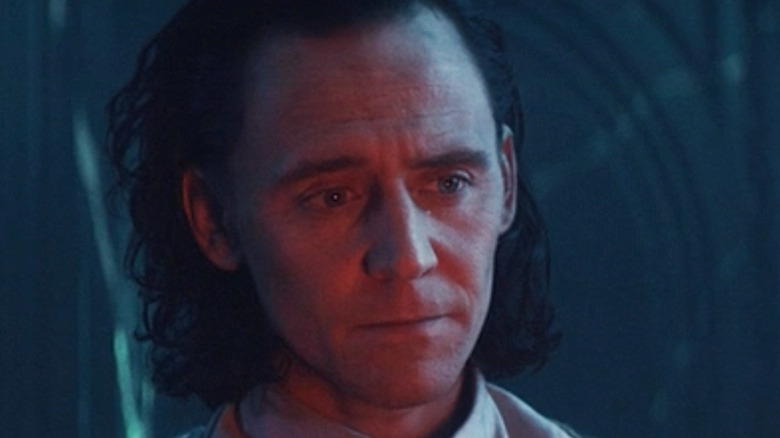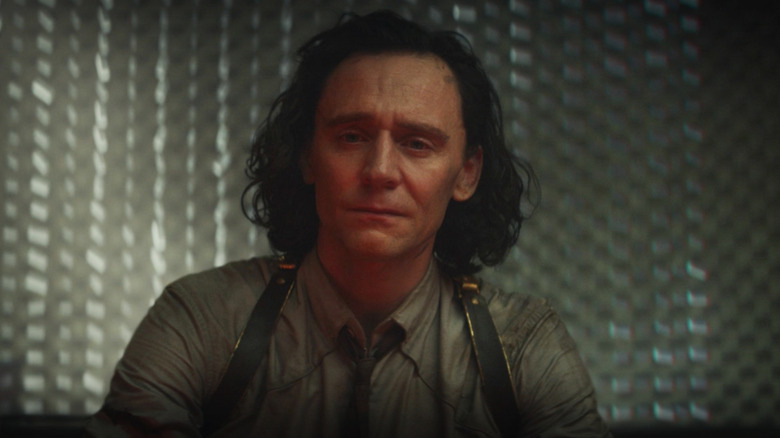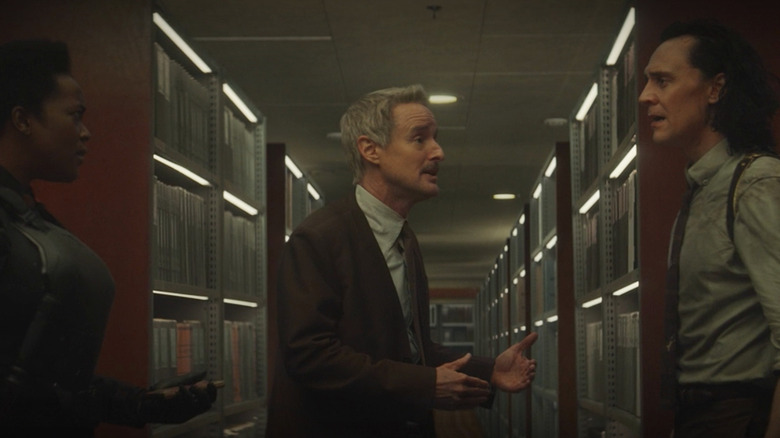The Saddest Loki Episode 6 Moment According To Fans Will Surprise You
Contains spoilers for "Loki" Episode 6
Ever since his big-screen debut in 2011's "Thor," Marvel's (and perhaps all of mythology's) most notorious and complex trickster-turned-anti-hero-turned-antagonist-turned-anti-hero Loki has captivated viewers. While this undeniable affection is no doubt helped along by actor Tom Hiddleston's painfully human portrayal of a character who — on paper, at least — doesn't (or shouldn't) inspire much loyalty, the fact remains that when it comes to Loki, fans just can't help but feel for the god. When Loki cries, viewers cry not just with him, but for also him. And though the God of Mischief has had his share of ups and downs over the millennia, there's one particularly gut-wrenching low point in the "Loki" Season 1 finale that hits on a few too many levels to be anything short of devastating.
Sure, it's somewhat less than glorious when Sylvie (Sophia Di Martino) — the woman (or, "other self) with whom Loki has just fallen in love, to the degree that a Loki can fall in love — decides that enacting her revenge on the proverbial "man behind the curtain" of the Time Variance Authority is more important or at least more practically attainable to her than allowing herself to trust and possibly even share a sort of life with Hiddleston's lovestruck Loki. And, sure, it's a pretty hard pill to swallow when Sylvie's last words to him are, simply, "I'm not you."
But it's what comes next for our freshly dejected hero that feels most like the sort of slap in the face from which Loki has had such a hard time coming back in the past.
Just when things were beginning to look up
From the get-go, viewers have been delighted by the banter-filled, antagonist bond shared by Owen Wilson's intelligent but guileless Agent Mobius and Hiddleston's indignant, guileful Loki. What begins as an intellectual tug-of-war kept in check by the characters' mutual need for one another's reluctant cooperation eventually develops into a genuine shared respect, the kind of burgeoning relationship that Loki – for one reason or another (betrayal, envy, power lust, creative differences) — never reliably or consistently forms with his adoptive brother Thor (Chris Hemsworth). This is to say, that for the first time in his oft-disappointing and lonely existence, Loki makes a friend.
More importantly, in the ever-analytical Mobius, Loki finds a friend who's actually interested in peeling back the layers of chaos, corruption, betrayal, and self-destruction to get the to heart of what really motivates the God of Mischief. Put simply, Loki finally feels seen by someone other than himself — which is what makes his ultimate encounter with Mobius in the "Loki" Season 1 finale so utterly excruciating.
'Who are you?'
While his loyalties may be (or, at least were) predictably inconsistent, there are two things viewers can rely on when it comes Loki: a lot of what motivates him has nothing to do with mere mischief and everything to do with a persistent identity crisis brought on by the discovery that he was adopted (or rather, stolen) by Odin from the Frost Giants, and that despite his penchant for destruction, Loki always manages to survive. So, it's of no small consequence that the trickster god's final interaction in "Loki" Episode 6 with perhaps his only real friend re-ignites the painful confusion of the former while questioning the reality of the latter.
When Loki lands back at the TVA in a fit of confusion and fear, his initial relief to find Mobius there — and in one piece — quickly turns to despair when he realizes Mobius has no idea who he is. What, after all, does it mean to "survive," if in the memory of the people for whom you care most, you never even actually existed? What's more, when Mobius casually asks, "Who are you?", Loki is left with the realization that, having lost the one person by whom he felt truly seen, Loki is the only one who might be able to answer that question. It's the kind of universally harrowing realization that makes a viewer feel not just for the god, but also for anyone who's ever struggled to come to terms with who they are, and what exactly their purpose and place is in this world — in other words, just about everyone.
"Mobius not knowing who Loki is anymore is the saddest part," one Marvel fan wrote on Twitter. "I'm in pain after the finale."
For now, fans will have to wait for Season 2 of "Loki" to find out what the ever-relatable trickster-turned-romantic-anti-hero will do with all this newfound (re-found) sorrow. In the meantime, if they need a shoulder to cry on or with, there's always Tom Hiddleston.


